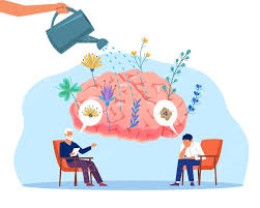
Rehabilitation and Recovery: A Journey Towards a Healthier Mind
2025-09-23 12:03:10When we hear the word rehabilitation, many people think only of physical recovery healing from an injury, surgery, or illness. But rehabilitation is not only limited to physical recovery. It is also about rebuilding the mind, emotions, and overall well-being. Mental health rehabilitation and recovery is a process of healing that empowers individuals to overcome struggles such as anxiety, depression, stress, trauma, substance abuse disorders and addiction .
Rehabilitation is not about fixing a person. It's about guiding individuals towards emotional resilience, healthy coping strategies, and renewed confidence. With the right support through counselling, therapy, lifestyle changes, and addiction recovery programs anyone can begin their journey towards a healthier mind and a brighter future.
Why Mental Health Rehabilitation is Important
1. Breaking the Cycle of Struggle
Mental health conditions like depression, anxiety disorders, PTSD, and addiction can feel like endless cycles. Rehabilitation programs help break these patterns with structured treatment, guidance, and mental health counselling services.
2. Building Emotional Resilience
Recovery does not mean you will never feel stress or sadness again. Instead, it helps you develop emotional strength, stress management techniques, and healthier coping mechanisms to handle life challenges.
3. Restoring Daily Functioning
Conditions such as chronic stress, substance use, or burnout can disrupt work, studies, and relationships. Rehabilitation helps restore productivity, balance, and social confidence.
4. Preventing Relapse and Setbacks
For those recovering from drug addiction, alcohol dependence, or behavioural disorders, rehabilitation provides relapse prevention strategies, peer support, and long-term recovery tools.
Key Elements of Mental Health Rehabilitation
1. Professional Counselling and Therapy
From cognitive behavioural therapy (CBT) to group counselling and family therapy, professional guidance helps individuals gain clarity, identify triggers, and create lasting change.
2. Medical and Psychiatric Support
For some individuals, medication for depression, anxiety, or bipolar disorder may be recommended alongside therapy. Proper psychiatric care ensures stability during recovery.
3. Mindfulness and Stress Management
Techniques such as yoga for mental health, meditation, deep breathing, journaling, and guided relaxation are widely used in rehabilitation to lower stress and boost mental clarity.
4. Social and Peer Support
Community healing plays a huge role in rehabilitation. Group therapy and peer support groups reduce loneliness, encourage accountability, and promote emotional healing.
5. Lifestyle and Wellness Programs
A healthy lifestyle is key to long-term recovery. Nutrition, exercise, sleep hygiene, and self-care routines are part of every successful rehabilitation plan.
The Recovery Journey: Step by Step
Recovery is a personal and non-linear process. Some days feel like progress, others may feel like setbacks but every step forward counts.
Awareness and Acceptance - Acknowledging the need for help.
Seeking Support - Reaching out to mental health professionals, support groups, or rehabilitation centre's.
Treatment and Therapy - Engaging in structured rehabilitation programs, counselling, and self-help practices.
Relapse Prevention - Identifying triggers and building strong coping skills.
Growth and Empowerment - Rediscovering purpose, self-esteem, and emotional strength.
Rehabilitation for Substance Abuse and Addiction
One of the most critical forms of rehabilitation is addiction recovery. Substance abuse affects both the body and mind, often leading to depression, anxiety, and relationship conflicts.
Drug and alcohol rehabilitation programs provide detox, therapy, peer support, and aftercare planning to ensure long-term healing. By addressing both physical dependence and underlying emotional triggers, individuals can achieve sustainable recovery and healthier lifestyles.
Breaking the Stigma Around Mental Health Recovery
Despite growing mental health awareness, stigma still prevents many people from seeking help. Some believe counselling or rehab is only for people with serious problems. The truth is, rehabilitation is for anyone who wants to improve their mental well-being, heal from trauma, or manage stress better.
Choosing recovery is not a weakness it's an act of strength, courage, and self-love.
Final Thoughts
Rehabilitation and recovery are not overnight solutions. They are ongoing journeys of healing, personal growth, and self-discovery. Whether you are struggling with anxiety, depression, stress, or addiction, remember you are not alone. With the right rehabilitation programs, counselling services, and mental health support, you can reclaim your life and build a healthier, stronger future.
Taking the first step may feel overwhelming, but it's also the most powerful decision you can make towards a healthier mind and emotional well-being.
